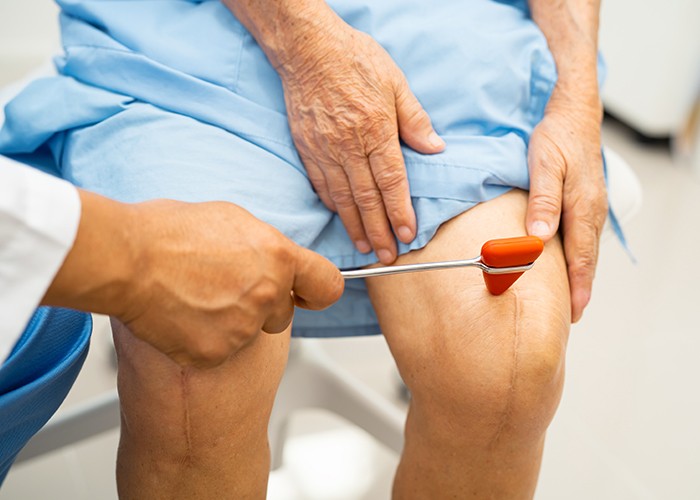How Effective Is Stem Cell Therapy for Knees Compared to Surgery?
Stem Cell Injections – A Minimally Invasive Healing Option
Stem cell injections can help reduce inflammation, repair damaged tissues, and decrease pain, particularly for orthopedic issues like joint pain. This minimally invasive treatment is being studied for a wide range of conditions.

Benefits for Orthopedic and Joint Issues
- Repairs tissue and enhances healing: Stem cells can differentiate into various cell types, such as cartilage, bone, and ligament cells, to help repair or regenerate damaged tissue. They also release growth factors and cytokines that support the body’s natural healing processes.
- Reduces inflammation: Injected stem cells can decrease inflammation by secreting anti-inflammatory proteins. This helps to break the cycle of chronic inflammatory events that can cause pain and ongoing tissue damage.
- Alleviates pain: By targeting the root cause of pain, inflammation, and tissue damage, stem cell injections can provide long-lasting pain relief.
- Improves mobility and function: For patients with joint issues like osteoarthritis, injections may help restore cartilage volume, increase range of motion, and improve overall function.
- Minimally invasive alternative: Stem cell therapy is less invasive than surgery, avoiding risks like infection and blood clots that are associated with invasive procedures. For some patients, it may also help delay or eliminate the need for joint replacement surgery.
- Rapid recovery time: Because the procedure is minimally invasive, it involves a fast recovery time with little to no rehabilitation needed.

How Effective Is Stem Cell Therapy for Knees Compared to Surgery?
Knee pain can hold you back from doing even the simplest things walking, climbing stairs, or enjoying your favorite activities. For many people, surgery feels like the only option. But what if there was a safer, less invasive way to ease your pain and restore mobility?
That’s where Dalton Clinic steps in with advanced stem cell therapy for knees. The big question is: how effective is it compared to surgery? Let’s break it down so you know why this treatment is changing lives.
Understanding Stem Cell Therapy
Stem cell therapy is an innovative treatment that uses the body’s own healing power to repair damaged tissues. At Dalton Clinic, a stem cell and regenerative medicine physician specialist prescribes a treatment plan where stem cells are sourced from an FDA-approved tissue bank.
Specialists carefully extract stem cells, prepare them, and then inject them directly into the knee. These stem cells help regenerate cartilage, reduce inflammation, and promote long-term healing. Most of our patients who had bone-on-bone with zero cartilage reported regenerating cartilage in their knee in 3 months.
Unlike surgery, which often requires months of recovery, stem cell therapy offers a natural and minimally invasive approach, where, typically, there is only soreness at the site of injection for a day. It’s about helping your body heal itself safely and effectively.
Why Patients Choose Stem Cell Therapy Over Surgery
Comparing Effectiveness: Stem Cell Therapy vs. Surgery
Surgery can be effective, especially in severe cases, but it’s not always the best first choice. Dalton Clinic has seen patients who previously considered surgery achieve strong results with stem cell therapy near me.
- Pain relief: Both options can reduce pain, but stem cell therapy does it without major disruption to your life.
- Mobility improvement: Stem cell therapy helps restore natural movement while preserving the joint.
- Long-term benefits: Stem cells continue working overtime, while surgery often leads to future complications.
- Lower risk: Surgery involves anesthesia, infection risk, and long healing; stem cell therapy avoids most of these issues.
For many patients, the effectiveness of stem cell therapy has been more than enough to delay or even avoid surgery altogether.
FAQs
Q1: How painful is the procedure?
Most patients experience only mild discomfort during treatment at Dalton Clinic.
Q2: How long until I notice results?
Improvement often starts within weeks, with ongoing benefits over several months.
Q3: Is stem cell therapy safe?
Yes. Since it uses your own cells, the risk of adverse reactions is very low.
Q4: Will I still need surgery later?
Many patients delay or avoid surgery altogether after receiving treatment at Dalton Clinic.
Q5: How long do results last?
Results vary, but many patients enjoy long-term relief with proper follow-up care.
Q6: Why should I choose Dalton Clinic?
Because Dalton Clinic combines expertise, cutting-edge technology, and a patient-first approach to deliver unmatched results.
A Smarter Choice for Knee Pain Relief
So, how effective is stem cell therapy compared to surgery? The answer is clear: it’s a powerful, less invasive alternative that delivers real results without the risks and downtime of surgery.
With the trusted care of Dalton Clinic, you’re not just treating your knee, you’re investing in long-term relief and mobility. Don’t let knee pain control your life. Take the first step toward recovery today with Dalton Clinic, the clinic patients trust for safe and effective stem cell therapy.
Potential Applications for Other Conditions
- Blood disorders: Bone marrow transplants, a form of stem cell therapy, have been used for decades to treat certain blood cancers and disorders by replacing unhealthy cells with healthy ones.
- Neurodegenerative diseases: Some research is exploring the use of stem cells to regenerate and repair damaged nerve cells for conditions like Parkinson’s disease, Alzheimer’s disease, and multiple sclerosis.
- Cardiovascular diseases: Researchers are investigating the use of stem cells to differentiate into heart cells to repair heart tissue damaged by conditions like heart failure.
- Diabetes: Studies are underway to explore if stem cells can differentiate into pancreatic cells that produce insulin.
- Wound healing: Stem cells aid the wound healing process by releasing growth factors, reducing inflammation, and promoting the creation of new blood vessels.
